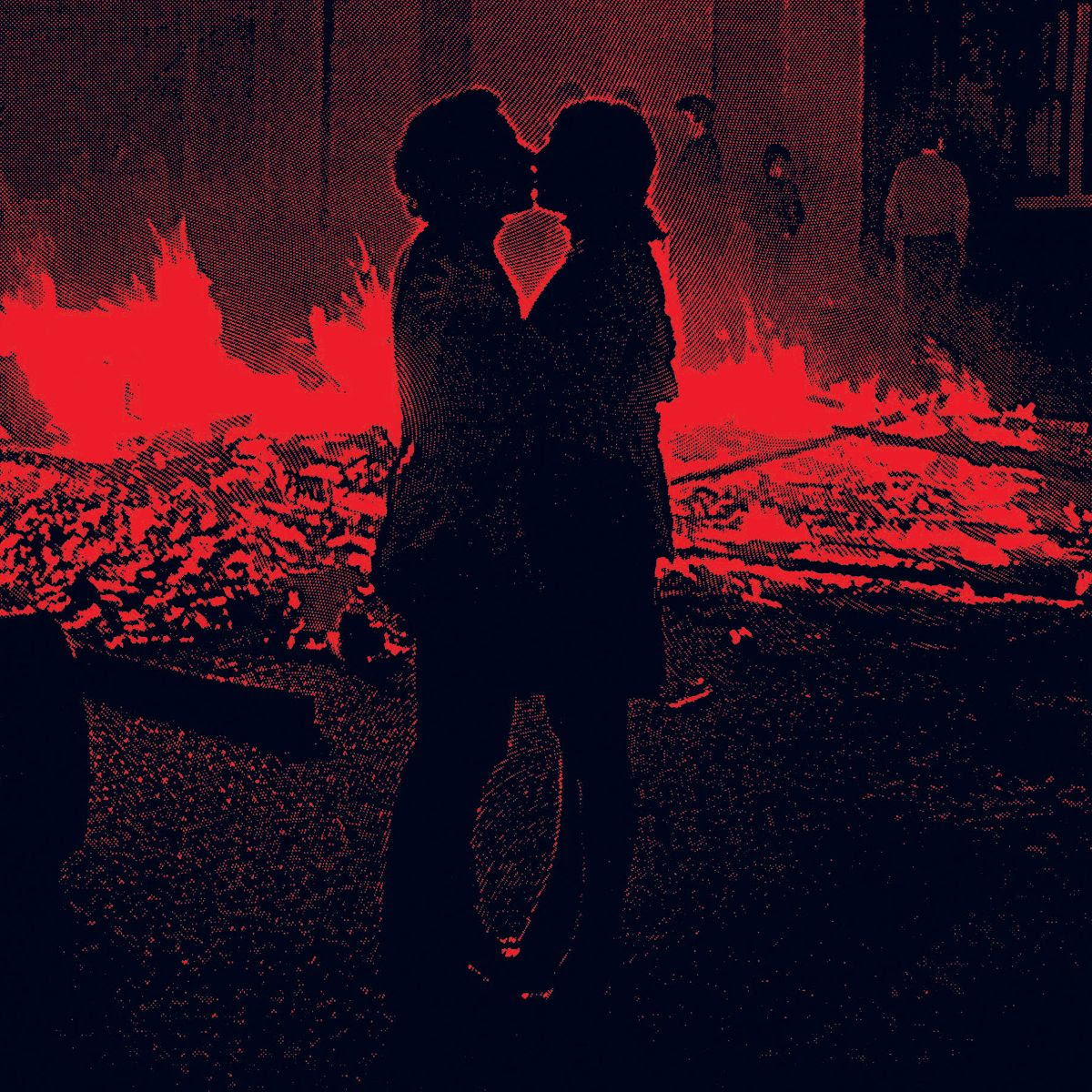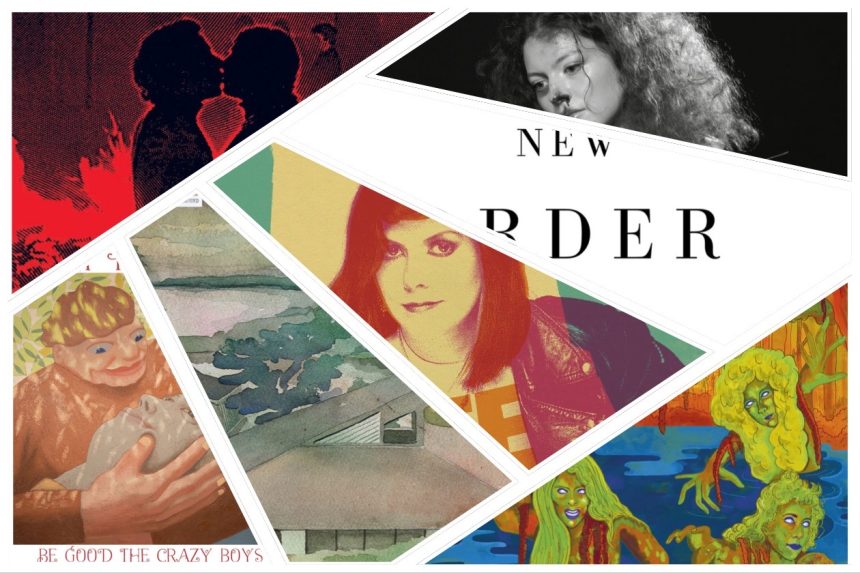This week’s Indie Basement, we’ve got reviews of new albums from Art Feynman (Luke Temple), Tyvek, David Holmes, Serafina Steer‘s band Bas Jan, and the debut album from Daneshevskaya, plus reissues from New Order and Kirsty MacColl.
Over in Notable Releases, Andrew reviews Wiki & Tony Seltzer, Aesop Rock, Chris Stapleton, and more.
In other Basement-related news: Pavement are taking their reunion into 2024; Twee pop cult icons Heavenly announced their first US show since 1995; Barbara Manning is back; Omni announced their first album in five years; and Spiritualized’s current tour is a must-see.
Head below for this week’s reviews

ALBUM OF THE WEEK: Art Feynman – Be Good the Crazy Boys (Western Vinyl)
Luke Temple turns his afrobeat-inspired low-fi alter-ego into a gangbusters live band for Art Feynman’s fantastic third album
On his first two albums as Art Feynman, Luke Temple explored just what he could do on a cassette four-track portastudio, channeling Awesome Tapes From Africa and other funky global influences through his own songwriting acumen. (Art was also featured in the first-ever Indie Basement column.) With Be Good the Crazy Boys, he’s exploring the Art Feynman aesthetic as a shit-hot full band, recording live to tape in the studio, captured in glorious high fidelity. Temple’s songs truly come alive in this setting with one memorable, danceable and fun song after the next.
You know the “Life During Wartime” performance in Stop Making Sense where Talking Heads are all running in place? Just about every song here sounds like they are jogging in the studio. Byrne and co are certainly an influence here, and while nothing here sounds like Talking Heads per se, Temple cites the famed Compass Studios in the Bahamas — where Talking Heads made Remain in Light and Speaking in Tongues and which also birthed records by Grace Jones, Lizzy Mercier Descloux, Jimmy Cliff and more — as a vibe touchstone. Disco, funk, afrobeat, new wave, jazz and tropicalia co-mingle on the dancefloor with frozen drinks in hand. Like with Byrne, though, the often angsty lyrical subjects are clearly from the mind of an uptight city dweller.
The best decision made on Be Good the Crazy Boys, apart from turning Art Feynman into a real band, was having keyboardist Rose Droll and guitarist Carly Bond sing backup. “Backup” actually undersells their presence: they’re integral to the album’s success. Think Bananarama on Fun Boy Three records, Dolly Mixture on Captain Sensible records, or the first Tom Tom Club album (also made at Compass Point). Droll and Bond are all over the record but nowhere more charming than on “All I Can Do,” full of ooh-ooooohs, Sergio Mendes ahhhhhhs, and a giddy point-counterpoint chorus where they and Temple complete each other’s sentences in a bit of dazzling vocal choreography. The song would still be good without it — laid-back, conga-fueled disco-funk with a vibrant Brazilian streak, you can almost hear what the old Art Feynman four-track version woulda been like — but Droll and Bond truly make it sing.
The arrangements on Be Good the Crazy Boys are inspired in general, from the saxophone charts and vintage drum machines on “Passed Over,” to the bouncing bouncing organs on the manic rat race of “In CD,” to “Desperately Free” which sounds improbably like Os Mutantes covering Inner City’s “Good Life.” Temple peppers the good times with plenty of neuroses which deepen the songs’ impact. “Im jumping out the window to be closer to the sky / the world and all its magnets is a sucking kind of high,” he sings on “Therapy on 3PM,” a song where he sees “lives fall like pianos to be smashed but never played.” Art Feynman makes a compelling case, at least as a supplement, for working out your issues out the dancefloor.
—

New Order – Substance (Rhino)
New Order’s essential 1987 12″ singles compilation gets its first vinyl repress since it was originally released ++ a 4-CD Deluxe Edition with b-sides and more
Some groups are decidedly “album” artists (Radiohead, PJ Harvey, prog) while others are “singles” bands (ABBA, Buzzcocks). New Order were both. For much of the 1980s the Manchester band kept their albums and singles separate, and they were masters of both forms, delivering complete works like Power Corruption & Lies and Low-Life, while at the same time moving dance music forward on groundbreaking 12″ singles like “Blue Monday” and “Thieves Like Us.” In 1987, Factory Records released Substance, a collection of all New Order’s 12″s to that point, not because they thought it was a good idea — New Order rarely did anything to purposefully sell records — but because label founder Tony Wilson wanted all of them on a CD that he could listen to in his car. The CD version also came with a bonus disc that collected b-sides and EP tracks that include some of New Order’s best-ever deep cuts. You could even get Substance on DAT! If you count these kind of compilations as “albums,” a case could be made for it being the band’s best.
New Order reissued most of their studio albums on vinyl a decade ago, but Substance wasn’t part of that campaign for whatever reason. (For a long while it wasn’t even on streaming services.) They’re finally getting around to it as part of their “Definitive Edition” series, available both as a standard double-LP set — the first reissue since it’s original pressing — and a deluxe 4-CD box set. It’s great to have it on vinyl again and it contains so many classics, including “Ceremony,” “Blue Monday,” “Thieves Like Us,” the extended “The Perfect Kiss,” Pretty in Pink’s “Shellshock,” and at-the-time new single “True Faith.” But the box set / digital edition is where it’s at, with all Substance Disc 2 tracks (including essentials “Procession,” “Hurt,” “Lonesome Tonight,” and “Murder”) plus a third disc that includes the original versions of “Temptation” and “Confusion” (which were re-recorded for Substance), dub versions, and other remixes, and a fourth disc featuring a full 1987 live show from Irvine Meadows Amphitheatre. Substance is more than just a Best Of, it’s a document of the most fertile period of one of the most groundbreaking groups of the 1980s.
Additionally, New Order have reissued three different 12″ singles from the era: “True Faith,” the Shep Pettibone remix of “True Faith”; and their 1988 update of “Blue Monday.”
—

David Holmes ft Raven Violet – Blind on a Galloping Horse (Heavenly)
Composer and producer David Holmes’ first solo album in 15 years is a fiery, entertaining call to arms
Irish musician and producer David Holmes is best known these days as a composer — he has worked extensively with filmmaker Steven Soderbergh over the last 25 years, and recently did the score and curated the soundtrack for hit series Killing Eve. But he came up in the ’90s as a DJ and was there for acid house, rave, trip hop, and the electronica revolution that swept the UK and Europe but never quite took root in the US and he still has a love of pop and club music. Coinciding with Killing Eve was his noir pop group Unloved, a trio with longtime collaborator Keefus Ciancia and singer Jade Vincent whose songs were used throughout the series’ four seasons. This year David has been very busy: Unloved put out great album, Polychrome, back in February; he worked on Noel Gallagher’s High Flying Birds’ also-very-good new album; and has now released his first solo studio album in 15 years.
Always best working with others, Holmes here collaborates on Blind on a Galloping Horse with vocalist and occasional Unloved contributor Raven Violet who gets above-the-title credit too. The album is an examination of the tumultuous last 10 years which saw Brexit, Trump, Covid, Black Lives Matter, Putin, and the death of too many friends. While Holmes has at times skated by on exceptional taste and a deep rolodex, a seething anger energizes the album which is engaging, tuneful, danceable and often moving.
As to the latter, head straight to “Necessary Genius” which pays tribute to “dreamers, misfits, radicals, outcasts” who are no longer with us, and includes shout-outs to Andrew Weatherall, Terry Hall, Sinéad O’Connor, Serge Gainsbourg & Jane Birkin, John Coltrane, Ennio Morricone, and more. It’s also a serious banger, halfway between driving post-punk and Kraftwerkian synthpop which is the general mode of the whole record. Speaking of Weatherall, “I Laugh Myself to Sleep” is a rework of an unreleased track by the late DJ and producer, and fits in perfectly with the rest of the record. There are also tracks featuring spoken word accounts from real life Ukranian and Afghan refugees, a Palestinian taxi driver and more, giving it a very right-now feel. Balancing things out are some wonderful tunes, like the irresistible, Spacemen 3-influenced “It’s Over, If We Run Out Of Love” which was co-written by Noel Gallagher. Holmes handles all these calls to action and pop moments with a deft touch, never hitting you over the head with the message and always leaving you humming.
—

Bas Jan – Back to the Swamp (Fire)
London four-piece, part of the Jarvis Cocker Extended Universe, mix synthpop and British folk on their terrific fourth album
Bas Jan are a London quartet founded by harpist, composer and singer-songwriter Serafina Steer that also includes Emma Smith — they’re both also in Jarvis Cocker’s JARV IS band — as well as Charlie Stock and Rachel Horwood. Formed a decade ago, Bas Jan mix mossy folk with synthpop for a unique, distinctly British sound. Back to the Swamp is Bas Jan’s fourth album and mixes boggy bangers (“At the Counter,” “No More Swamp”) with violin-soaked, windswept, folky prog that wouldn’t have been out of place on the Wicker Man soundtrack. It’s compelling and often danceable — also their best record yet — all while dropping references to Salt N’ Pepa, living your best, and arguing we should maybe chuck it all and return to the world’s primordial ooze days before we humans messed everything up.
—

Tyvek – Overground (Ginkgo)
Detroit lo-fi DIY legends keep doing what they do best
Detroit’s Tvyek are revered DIY lifers, still flying the lo-fi flag nearly 20 years into their existence, laying it all on the line via cheaply recorded two-minute punk blasts informed by the Ramones, The Fall, Television Personalities, etc, but shot through their distinctive Midwest Michigan worldview. Overground is Tyvek’s first album in six years and is a welcome return — 11 bleaty jams flecked with skronky sax, frontman Kevin Boyer’s free association (but thoughtful) lyrics and more musical finesse than the hissy recordings may suggest. Tyvek burn through the first 10 songs in less than 20 minutes before letting things stretch out on the seven-minute title track where Boyer sees a rudderless world “braindead on karaoke” and wonders “Is it too late to be stateless? / It’s hard not to feel powerless / But we’re capable of so much.” May Tyvek continue to search for answers for some time to come.
—

Kirsty MacColl – See That Girl 1979-2000 (Universal)
This eight-CD box set collects nearly everything the late, great MacColl ever made, including lost 1983 album ‘Real’
The late Kirsty MacColl was one of those Artists’ Artists, beloved by fellow musicians and critics, and with a distinctive harmony style that made any record she sang on better, from The Pogues, to The Smiths, Billy Bragg, The Rolling Stones, and more. Married to producer Steve Lillywhite, MacColl had a Record Exec’s golden ear — she sequenced U2’s The Unforgettable Fire — even though labels were more often than not at a loss for how to market her music. What hits she had, including “There’s a Guy Down the Chip Shop Swears He’s Elvis” and a cover of Billy Bragg’s “A New England,” always ended up being unreplicatable flukes. The closest she came to success in the US was penning “They Don’t Know,” which Tracey Ullman covered and took to #8 on the Billboard Hot 100 in 1982.
Despite not getting the attention she deserved at the time, MacColl left the world with a lot of great music to enjoy and remember her by, and all of that has now been collected in this eight-CD box set featuring just about everything she ever did, including all five studio albums, plus singles, b-sides, demos, live songs and more with 47 previously unreleased tracks. Most of it played to her strengths — jangly pop inspired by girl groups, country and her Irish upbringing — but she successfully dabbled in dancepop (1990’s “Walking Down Madison,” co-written with Johnny Marr), Brazilian music (final album, 2000’s Tropical Brainstorm) and other styles.
But to hear just how wrong labels got it with Kirsty, See That Girl includes her second album, Real, which was made in 1983 but never released. Recorded with Specials producer Dave Jordan, it mixes Irish music, Zydeco, reggae, post-punk, and you name it with then-modern electro-pop arrangements. Much of it is interesting — and will be fascinating to fans — but little of the album uses what made MacColl such a talent. It’s a baffling listen. Best to head to records like 1999’s Kite that put her love of country, fantastic melodic skills and way with harmonies in the spotlight. Kirsty, you were gone to soon and this is a love letter to all your talents that managed to shine through despite all the major label b.s. she had to deal with.
—

Daneshevskaya – Long Is The Tunnel (Winspear)
Beguiling debut from very talented Brooklyn singer-songwriter
Anna Beckerman grew up in a musical household — her father is a music professor, her mother studied opera — and she has played in bands — including Modern Diet — for the better part of a decade. Now she’s releasing her solo debut. Anna’s extended family tree is a central theme and major influence on Long is the Tunnel, which she released under her middle name, Daneshevskaya. She was named after her Russian-Jewish great grandmother, and stories about her and her grandparents (who passed during the making of the album) informed many of the album’s songs. Produced by Model/Actriz drummer Ruben Radlauer, the album is about as far away from that band’s abrasive sound as you can get, crafting a dreamy brand of pop that incorporates shoegaze, anthemic rock, delicate folk and classic Disney soundtracks. A somewhat disparate mix of sounds, it’s rendered seamlessly, often in widescreen orchestration, with Beckerman’s beguiling songs and voice at the center. Not bad for a debut.
Looking for more? Browse the Indie Basement archives.
And check out what’s new in our shop.










